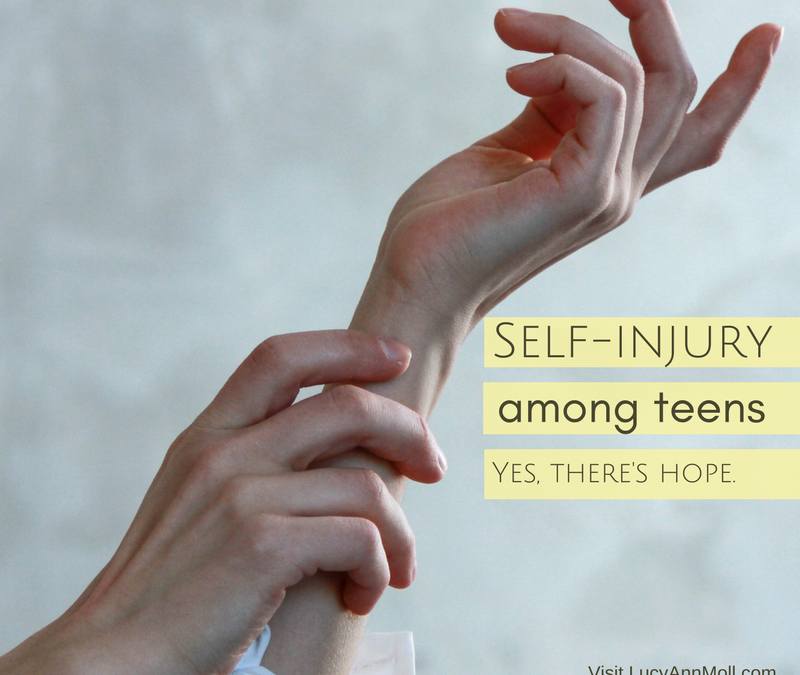
by Lucy | Jul 6, 2018 | biblical counseling, emotions
LUCK? When things go right, is God at work or are you just. . . lucky? Biblical Counselor Julie Ganschow, listed on Heart2Heart Counselor directory here, is director of Reigning Grace Counseling Center in Kansas City, MO. She writes at bc4women.org, where this article first appeared. It is used with permission.

A while back I visted Las Vegas. Even though I know that the city is built on gambling and games of chance, I was still struck by the thousands of people filling casinos playing card games and slot machines hoping to strike it rich on a quarter or a dollar. While out and about, I saw many people wearing their lucky t-shirts and carrying their lucky charms.
How often do you use the word “lucky” in relation to a situation?
I hear people say things like, “Lucky that car stopped when it did.” or “My luck ran out.” Even that childhood saying, “lucky ducky” carries the idea that our fates and fortunes are in the hands of some mystical force called “luck.”
Are Close Calls Just Good Luck?
This got me to thinking. To what should we as Christians credit the things that occur in our daily lives; those close calls and narrow misses. How much of what happens in our lives do we chalk up to luck?
Click & Tweet!
Sometimes I think we say it was providence but really think “luck” because we know that as people of faith it is not acceptable to rely on luck. As Christians, we have all heard the warnings against using the word “luck.” The idea is superstitious and goes against the sovereignty and providence of God.
For he will deliver the needy when he cries for help, The afflicted also, and him who has no helper.Psalm 72:12
Our command is to think biblically about life and all it contains. By His grace, God brings and allows things into our lives. His purpose and intention is multi-faceted, but the overall goal is Christ-likeness. God is orchestrating our circumstances for His glory and our good.
That car didn’t stop before hitting you out of luck, it stopped because it was not in God’s plan for it to hit you. If you were injured or hurt, that too was somehow in His plan. God does not exercise His sovereignty on a whim, or impulsively, but only in a way that His love deems best for us.
God Gives Us Mercy
It is when the Word of God is applied to the heart of a person that understanding comes. Many times we don’t realize that we are not thinking biblically until we sit down and face it in a quiet moment. God is rich in grace and mercy, and He delights in pouring it out on His children. He always stands for us.
Our soul waits for the LORD; He is our help and our shield. Psalm 33:20
God is our refuge and strength, A very present help in trouble. Psalm 46:1
Why Don’t We Get What We Deserve?
The Bible says He will deliver the needy when he cries for help (Psalm 72:12). Why?
Why does He shower us with grace and give us mercy? And why does God not give us what we truly deserve?
And He did so to make known the riches of His glory upon vessels of mercy, which He prepared beforehand for glory, Romans 9:23
…so these also now have been disobedient, that because of the mercy shown to you they also may now be shown mercy. Romans 11:31
…and for the Gentiles to glorify God for His mercy; as it is written, “Therefore I will give praise to You among the Gentiles, And I will sing to Your name.” Romans 15:9
But God, being rich in mercy, because of His great love with which He loved us… so that in the ages to come He might show the surpassing riches of His grace in kindness toward us in Christ Jesus. Ephesians 2:4-7
Yes, God shows us mercy because we need it. We need a reprieve from what we have coming to us precisely because we are so sinful. We are the afflicted; we are the dead, the transgressors. Our ugliness and His redemption of us while we were in the ugliest state possible bring Him unbelievable glory.
Glorifying the One True God
All other gods require us to come to them clean and add to our goodness. Jehovah God is the only God who takes us as we are; dead in our trespasses and sins, living in the lusts of our flesh, indulging the desires of the flesh and of the mind, and by nature children of wrath.
We were not shown mercy and given help because we were so good, but because we were so evil. God did not add His goodness to ours and make us better; He added His goodness to our sinfulness and made us clean. He did for us what we could not do for ourselves.
God helps us and shows us mercy because it glorifies Himself. May He be forever glorified on earth and in the heavens!
Counseling Hearts to Hope,


by Lucy | Apr 18, 2018 | biblical counseling, emotions, relationships
TEEN SEX: The thought that your son or daughter is sexually active cuts Christian parents to the core. Biblical counselor Julie Ganschow, who’s listed on Heart2Heart Counseling Directory, describes the prevalence and dangers of teen sex, and she encourages parents too. Her article appeared first here on The Biblical Counseling Coalition and is used with permission.

Fourteen-year-old “Angela” (not her real name) sat in my counseling office at the request of her mother. Angela had been displaying some behaviors that caused concern and led her mom to investigate her daughter’s activities. While checking Angela’s cell phone, she was horrified to learn that Angela had been sexually involved with her 16-year-old boyfriend.
Angela is one of nearly half of all students in ninth through twelfth grade who have had sexual intercourse. Sadly, 14 percent of those students have already had four or more sexual partners in their young lives.
Our teens live in a sex-saturated culture. Television and movies routinely show men and women who barely know one another having sex, and this promotes the idea that there is no difference between sex and love. It is critical that we communicate the message: Immoral sex is not “love,” it is only sex.
Click & Tweet!
So flee youthful passions and pursue righteousness, faith, love, and peace, along with those who call on the Lord from a pure heart (2 Tim. 2:22).
Dangers of Teen Sex
There are many dangers for a young person who becomes sexually active. Parents are most often concerned about pregnancy, abortion, and sexually transmitted diseases. However, with the marketing of vaccinations to prevent cervical cancer and medication to treat herpes, there is a mistaken view among some adults that teen sex is not a big deal. Nothing could be further from the truth.
 In addition to physical issues that can result from sexual activity at a young age, there are significant emotional dangers. Teenage sexuality often leads to emotional distress, especially for girls. In a majority of teen sexual encounters, there is no “relationship” behind the sexual act being performed. Teens are taught that sex is little more than the satisfaction of a physical urge and that everyone does it.
In addition to physical issues that can result from sexual activity at a young age, there are significant emotional dangers. Teenage sexuality often leads to emotional distress, especially for girls. In a majority of teen sexual encounters, there is no “relationship” behind the sexual act being performed. Teens are taught that sex is little more than the satisfaction of a physical urge and that everyone does it.
The reality is they are not emotionally ready for sex. Teenagers are already experiencing a complicated array of emotions from the hormonal changes taking place in their bodies, and when sexual activity is added it only makes those feelings more intense and confusing.
Emotional Impact
Sexually active teens often report having feelings of self-contempt and worthlessness. Angela eventually realized she had been withdrawn, depressed, and angry since becoming sexually active. One study involving 8,200 students, ages 12 to 17, found that those involved in romantic relationships had significantly higher levels of depression than those not involved in romantic relationships.[1]
Angela was brought up in a home where morality is valued. Her mom taught her to cherish her virginity, so giving it away while young and unmarried brought her tremendous feelings of guilt, shame, and loss.
Flee from sexual immorality. Every other sin a person commits is outside the body, but the sexually immoral person sins against his own body (1 Cor. 6:18).
Angela expressed a sense of being trapped into having to say “yes” to sex since that door had been opened. She described being pressured to have sex on every date she had with her boyfriend. Angela also told me she didn’t like sex, but didn’t think she could say “no” to him. She considered it to be meaningless and it had become a pastime, more of a social activity that she and all her friends were doing.
Over the weeks we met together, Angela realized that her view of sex lacked the sacred beauty and richness that God intends for it to have.
Angela learned that while she could experience the physical aspects of unity, sex outside of marriage would never contain the critical spiritual element– the oneness– that is present between a woman and her husband within the covenant of marriage.
Parents Needed
Our kids are confronted with all the wrong images and ideas about sex from the moment they wake up until they close their eyes and sleep. Sexual messages fill their music, commercials, radio, computer, classrooms, peer groups, parties, music videos, movies, books, phone conversations, and even their drive down the highway. Unless parents speak up, there will be no counterbalance to these messages.
Training us to renounce ungodliness and worldly passions, and to live self-controlled, upright, and godly lives in the present age (Tit. 2:12).
Parents are the best, most qualified people to tell their children the truth about sexual issues.
Click & Tweet!
It should be part of the training that takes place in the home. Kids need to hear from their parents that God gave married couples the gift of intimacy to enjoy. Teach them that within marriage, a couple can have abundant, fearless love. Trust and commitment in marriage make it possible for both husband and wife to enjoy each other in a way that is devoid of guilt, shame, fear, and doubt.
Questions for Reflection
How can parents better engage their teenagers and help them navigate these difficult issues around teen sex? What are some ways to protect teens from the cultural and social pressures to be sexually active?
[1] Kara Joyner and J. Richard Udry, “You Don’t Bring Me Anything But Down: Adolescent Romance and Depression.” Journal of Health and Social Behavior 41 (2000) 369-391
Counseling Hearts to Hope,


by Lucy | Apr 10, 2018 | biblical counseling, emotions, relationships
Self-Injury among teens (or anyone) doesn’t make sense, right? But for someone who self-harms, the act of cutting or burning (as well as other forms of mutilation) reduces emotional distress. And it has a root cause. This article by Julie Ganschow, who is listed on Heart2Heart Counselor Directory, first appeared here on The Biblical Counseling Coalition website and is used with permission.

Rebekka, 15, wore a hat, long sleeves, and jeans to our first counseling session. Not so unusual for a teen, except it was a hot August afternoon and the temperature outside was 101 degrees.
As I got to know Rebekka, I learned she was sent to see me because she was self-harming. She had no eyelashes or eyebrows, and her hat concealed large bald spots where she had pulled out her hair. I eventually saw the dozens of scars on her arms and up and down the length of her legs, where she had repeatedly cut herself and picked off the scabs. She also bore numerous burn marks from cigarettes and lighters.
Cutting and burning are the most common forms of self-injury among teens who we see in our counseling center.
Why Do Teens Self-Injure?
The teenage years (when self-injurious behaviors commonly begin) can be traumatic times. This can be especially in our culture, where children are presented with decisions and choices they are not mature enough to handle.
Our teens have greater pressures than at any time in history.
Click & Tweet!
College preparation now begins in eighth grade for many students, as they have to make choices about Advanced Placement classes. Many high school students work 20 or more hours per week to save for college. This is in addition to attending classes and doing AP homework.
At school, teens receive mixed messages about relationships and sexual orientation. Sexual behaviors are taught in graphic detail and promoted in the popular media. Our children are pressured to be sexually active long before they are emotionally and physically ready. They are thrust into many situations they are not ready to deal with! Some deal with the heartache of a broken home, spending alternate weekends with each parent, and the pressure that comes from being in the middle of divorce.
These are only the “normal” stresses and do not cover the extreme cases, such as sexual abuse by a parent or step parent; drug or alcohol use in the home by parents; out-of -control siblings who raise tension in the home; same-sex unions, sexually transmitted diseases or abortion.
Many children and teens come to believe there is little they can count on and nothing that is stable. Who can they talk to besides each other? Who can they really trust? All these factors feed into the world of self-injury among teens, and it becomes their method of dealing with indescribable pain and loneliness.
Like other self-injurers, Rebekka reported that she felt empty inside, stressed, and unable to express her feelings. She struggled to tell me she was lonely, not understood by others and fearful of intimate relationships and adult responsibilities. Self-injury was her way to cope with or relieve painful or hard-to-express feelings.
What Can I Do to Help?
There is no quick fix, no systematic formula to follow in stopping self-injury among teens. I encourage parents to follow biblical principles rather than going the route of psychotherapy and secular counseling. Secular reasoning is contrary to biblical methodology. The self-injurer doesn’t have an illness that can be medically diagnosed. Rather, she has is a faulty coping mechanism that has become a sinful habit.
Whenever possible, I involve the parents in the counseling process. We teach the parents how to disciple their child through this turbulent time in life. God entrusted Mom and Dad to care for their child and I am there to support them in teaching, rebuking, correcting, and training their child in righteousness (2 Timothy 3:16).
The biblical perspective on self-injury among teens is that it is primarily a heart issue (Matthew 15:11; Matthew 15:17-20; Luke 6:43). Like other self-injurers, Rebekka had an overall focus on herself: her pain, loss, feelings, her wants, and her desires.
She learned to examine her heart in light of Scripture (Jeremiah 17:9). The Bible reminds us that permanent change requires a change of heart brought about by a renewal of the mind (Romans 12:2). We had to identify the root cause of her behavior so true healing could take place.
Run to God with the Pain
I encouraged Rebekka to go to God in prayer and lay down the burdens of her heart.
The LORD hears the needy and does not despise his captive people (Psalm 69:33).
Directing Rebekka to the Psalms brought comfort and insight about crying out to God in distress. She was reminded that God cares about her, and the weight of guilt, shame, failure, anger, and rejection she carries. Also she was greatly comforted in realizing the Lord Jesus Christ was intimately acquainted with every sorrow and pain she had.
The Psalmist wrote,
Turn Yourself to me, and have mercy on me, For I am desolate and afflicted. The troubles of my heart have enlarged; Bring me out of my distresses! Look on my affliction and my pain, And forgive all my sins (Psalm 25:16-18, NKJV).
In biblical counseling, Rebekka learned the necessity of repentance. She learned about the sovereignty of God, people pleasing, and how to deal biblically with anger, hurt, and bitterness. As her mind was renewed, she began to understand the role idolatry played in her behaviors. She realized how worshipping her idols only led to guilt, shame, and deception and that, in reality, self-injury didn’t help with her pain after all.
Initially she experienced many failures and would still revert to cutting or burning herself, but Rebekka persevered in righteousness. She was determined to glorify God and worked very hard to stay in the Word, put the behavior off, renew her mind, and put on the new self (Ephesians 4:22-24).
She made life application of what she was learning and denied her fleshly desires. Six months later, she had eyebrows, eyelashes, and the bald spots on her head were covered with hair. The real triumph came when she gave her parents her “treasure box” of razor blades and burning materials.
Click & Tweet!
Today, Rebekka is free.
So if the Son sets you free, you are truly free (John 8:36, NLT).
Join the Conversation!
Do you believe the Word of God is enough to address even the “hard cases” in counseling?
Counseling Hearts to Hope,


by Lucy | Mar 19, 2018 | biblical counseling, emotions, relationships |
There’s an addict addict in your home, and he (or she) is a loved one, and you need help. So what should you do? Guest writer Julie Ganschow, a biblical counselor listed on Heart2Heart Counselor Directory, shares understanding and direction. Her article appeared first here on her website and is used with permission.

When you learn your loved one is an addict it rocks your world. The first thing you have to understand is that life will never be the same. Whether the addict is your spouse or your child, your life is now going to be different. I realize that is a rather hopeless statement on face value, but it doesn’t have to be.
Life not being the same doesn’t mean it will always be bad and chaotic; it means it will be different.
The realization that your spouse or child is an addict is horrifying and terrifying. Suddenly all the crazy things that have been happening make sense. Their moodiness, anger or rage, isolation, disappearing for periods of time, financial problems, secrecy, all these things come together in an ugly realization.
When you really think about it, life has not been “the same” for a while now. The difference is, now you can identify the reason why. Now you can make changes that will help you and your family—including the addict—to adjust to the changes.
Yes, You Can Move Forward
As terrifying as learning the truth about your loved one is, there is something strangely comforting about understanding the reason behind all the crazy things that have been happening in your lives. Now you can arm yourself and become informed about what you are dealing with. You can learn how to respond and what not to do. So while life will never be the same, and no one ever wishes for these kinds of changes, you can now at least meet life on life’s terms and deal in reality. Accept what you are dealing with and that you will grieve and endure suffering in this process.
You have taken steps into suffering and sorrow already. Having a loved one that is addicted to alcohol or drugs tends to be seriously distressing.
Having an addict in the family causes problems in a wide range of areas. An adage that you need to remember is, “Addicts don’t have relationships. They take hostages.” An addict is interested in having a relationship with only the substances that he ingests. There is no room in his heart for a relationship with any person that will detract or distract him from pursuing what he really loves: His addiction.
The people in the addict’s life are tools to help him get what he wants which is drugs or alcohol. People are there to be used. I won’t deny that the addict may still love you on some level, but if the choice is you or the substance he ingests, any good addict will choose the substance over you. This is why in families the addict can cause such a disruption. They are highly manipulative, skilled in lying, and playing on the sympathetic heartstrings of those who love them. When they are denied what they want, you see their true love and allegiance come out as they scream, and tantrum, and threaten, and rage against anything and everyone that gets in the way of them getting high.
Why ‘Stop it’ Won’t Work
The addict’s life becomes all about self-gratification – meeting the felt needs of excitement, pain relief, escape, or comfort. They are inward focused and all that matters is getting their needs met in whatever way possible, whether it is begging, borrowing or stealing from you. The pursuit of self-gratification becomes all-consuming.
We consider attaching the label “addict” when a person’s desires have become idols. The addict is an idolater because he worships something other than God.
We have been created to worship God, but the addict’s sinful lusts have driven him to worship and idolize other things; the things of the world. This is why having an addiction is a kind of worship and why addiction is a worship disorder. The addict has a heart/soul problem, not a medical or psychological problem.
Continually feeding the idol of drugs or alcohol will eventually create a physical dependency, but the heart which Jeremiah. 17:9 identifies as self-focused, deceptive and desperately wicked, has been enslaved long before the body becomes addicted. The addict’s heart—his thoughts, beliefs, and desires—were hooked first.
The mind is focused on the flesh. Therefore it becomes hostile to the things of God, and the person becomes a commandment breaker and very often a lawbreaker (Romans 5:8).
“Addiction” becomes a self-perpetuating cycle of self-worship and self-abuse as the addict becomes a slave of self. What he or she once controlled, now controls them.
Click & Tweet!
What You Can Do
While you can’t stop them from sinning, you also don’t want to continue to do things that will enable them to get high or drunk. The phrase “don’t be an enabler” may be familiar to you as coming from the 12-step world of Al-Anon. Don’t discard the principle because you don’t like the source. Other words for enabling are: allowing, permitting, empowering, aiding, assisting, facilitating, making possible. In other words, don’t willingly help them to get high, and don’t do things that make it easier for them to do so.
Make financial boundaries: Implement boundaries to detach yourself financially from your addicted loved one. You do not control whether the addict uses or not, but you can control whether (or how much) you contribute to funding the addict’s chemical use.
Do not give money to your addicted loved one. (Most people I counsel this way refuse to implement financial boundaries. The result is usually more of the same.) Do not provide vehicles, insurance funding, or tuition to addicted persons. I commonly see parents let addicted children live in their homes rent free. Ousting the addict into independent living will not necessarily stop chemical use but it will require them to divert more money from funding their addiction to paying for their independent room and board.
If your son, daughter, or spouse makes the decision to live as a homeless person, it will hurt you terribly.
But please understand that they will do this until it is time for them to change. You cannot change them or those circumstances. It will not help them for you to give them a bed in your home if they continue to live the lifestyle of an addict. In fact, you will be hurting them.
Allow natural consequences: The emotional struggle to truly turn the addicted loved one over to God and the fearful “natural consequences” that the addict may encounter (or possibly die from) such as crime, personal neglect, or intoxicated accidents commonly prevents family and friends of the addicted person from truly “letting go.”
This requires a leap of faith, and constitutes a trial for friends of the addicted person.
I have heard transformed (repentant) former addicts refer to it as “coming to the end of one’s self.” Often a similar dynamic holds true for the family and friends of the addicted person, and their unwillingness to trust God in the full vent outcome for the addicted person. This may seem harsh and unloving, but I assure you, pain is a strong motivator for change.
If you are in such circumstances, please seek help from a knowledgeable Biblical Counselor for yourself and your other family members to deal with the pain and resulting emotions from having an addicted-idolater in your family.

Resources for YOU!
Books:
Divine Intervention: Hope and Help for Families of Addicts
The Heart of Addiction by Mark E. Shaw
Addictions: A Banquet in the Grave by Ed Welch
Crossroads: A Step-by-Step Guide Away from Addictions by Ed Welch
Counseling:
If your loved one is an addict, you are on a hard road and you need help too. Contact me to schedule a no-cost 15-minute consultation to see how biblical counseling can help you.
Counseling Hope to Your Heart,

by Lucy | Feb 13, 2018 | biblical counseling, relationships
 Marriage: Is it too late for mine? In this frank article, Julie Ganschow says when God’s involved, nothing is impossible. . even when husbands move on or wives check out. Julie is listed here on our Heart2Heart Counseling Directory. Her article appeared first here and is reprinted with permision.
Marriage: Is it too late for mine? In this frank article, Julie Ganschow says when God’s involved, nothing is impossible. . even when husbands move on or wives check out. Julie is listed here on our Heart2Heart Counseling Directory. Her article appeared first here and is reprinted with permision.

“Is it too late to save my marriage?”
I have been asked this question over and over in the counseling office. And I hesitate to say that “too late” applies to a marriage that involves a Christian, and especially two Christians. I also hesitate because that implies that God is not able to change them.
When God is involved, nothing is impossible!
There’s Hope. . .Always
When troubles persist even in a “Christian” marriage, damage continues to mount and love grows cold. The actions of love cease to exist as withholding of affection, attention, and serving each other become commonplace. Bitterness and resentment often grow between the couple. And distance becomes preferable.
This is where things usually are by the time the couple comes for biblical counseling.
I want to encourage you by reminding you nothing is impossible when God is involved. This is true even if your husband has left you, moved out, or moved on. When people are willing to do what God asks of them in spite of how they feel great things happen!
Maybe You’ve Checked Out
That being said, some women reach that certain point emotionally where they just give up and refuse to believe anything will ever change. I call it “rounding the corner.” When this happens it is very rare for her to return to the marriage. Her heart hardens. She refuses to cooperate anymore in counseling, or to give her husband another opportunity to change and get it right.
Sometimes it is because he has promised for months or years to change and nothing lasting has happened. Sometimes she finds someone else. And other times she is just without hope anymore.
All of these are sad, and even sinful responses a person can have to someone else’s sin. That may sound harsh to you, but I speak from the perspective that God is able to do more than we ask or imagine according to His will.
Click & Tweet!
It is not God’s will that two people who make a covenant before Him to be husband and wife . . .decide they don’t want to be married anymore.
Change Begins in the Heart
Christian woman, if you want to save your marriage, begin by becoming husband-oriented.
Click & Tweet!
Eph. 5:22-24 gives us some instructions about our role in the marriage with respect to submission.
Wives, submit yourselves to your own husbands as you do to the Lord. For the husband is the head of the wife as Christ is the head of the church, his body, of which he is the Savior. Now as the church submits to Christ, so also wives should submit to their husbands in everything.
But how many women have ceased complaining and arguing but are unsubmissive in their hearts? Many I fear!
Women who are not husband-oriented are as much a problem as husbands who are not wife-oriented! Many women have become so supremely selfish! In counseling I hear about “my career”, “my private time”, “my time for the spa” (or shopping or fill in the blank). With this attitude, soon the couple leads separate lives.
Make a New Commitment
If this describes you totally or even remotely, then it is time to make a new commitment to become a “new person.” Yes. . .1 + 1 = 1
If you have lived for years or even months independently as a couple, it is going to take some work from both of you to change this. You will need to commit to change, change of the heart. But there is hope.
Sharing Hope with Your Heart,


![]()








 Marriage: Is it too late for mine?
Marriage: Is it too late for mine?
